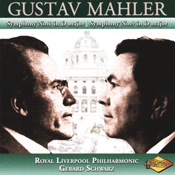The pairing is optimal in terms of the timings and also the relationship between the two works, with the reminiscences from the earlier work in the later one contributing some aspects of unit to the set. As with Gerard Schwarz’s other recent Artek release of his recording of Mahler’s Seventh Symphony with the Royal Liverpool Philharmonic, these performances offer solid interpretations of two very different works.
The recording of Mahler’s Ninth offers a fine interpretation, with a particularly well conceived reading of the first movement. As spacious as his conception of this piece may be, it is also possesses a dynamism that makes it compelling. Schwarz clearly knows the score in his attention to the details found in it, and in adhering to them allows the composer’s intentions to be heard clearly. The tutti passages are nicely voiced, with full-sounding chords that are rich in harmonic nuance and timbre; yet the sections that Mahler scored in a more intimate manner are nonetheless compelling for the way the smaller combinations of instruments emerge.
The paired Scherzo movements at the core of the Ninth almost merit attention for the ways in which Schwarz allowed each to have its individual character. The first of the two offers a contrast to the opening movement and if fault can be found, it is in the relatively quick transition between the movements. A minor quibble left to engineering, it should not reflect on the performance preserved here. With the second Scherzo Schwarz meets the rhythmic challenges of the music well, and from the outset distinguishes its character from the movement that precedes it. The brass are prominent in the second Scherzo, and Schwarz is good never to let them become unnecessarily raucous. Rather, there is a deft touch that emerges in this interpretation, a touch that allows for fluid transitions between the sections of the Rondo-Burleske. More than that, details, like the string glissandi are neither slightly nor over-accentuated.
Given the sustained mood of the recording, it is unfortunate that the final movement is separated through its placement on the second of the two discs. Again, this is a physical reality of the issue, not a fault in the performance. Here Schwarz sets the tone of the movement from the start, and the strings of the Liverpool Philharmonic respond well to his leadership. The rich textures emerge well in this recording, with the divisi scoring augmenting the tone colors and never obscuring them. Schwarz is good not to linger prematurely in this movement, but to maintain the logic of the musical structure in taking the piece to its conclusion. When the scoring thins, the voicing is never wanting, as the musical line unravels in the final section of this movement. The concluding passage is convincing and, in the atmosphere of the live performances that are the basis of the recording, would benefit from the inclusion of the audience’s applause at the end of the piece.
Recorded several years before, Schwarz’s interpretation of Mahler’s First Symphony is as convincing as the Ninth. As he would do later with the Ninth, Schwarz maintains a sense of direction that allows the structure to emerge in the opening movement of the First Symphony. It is good to hear the rhythmic precision of the various imitation bird-calls, such that the play of duple and triple figures is distinct. When it comes to the quotation from second song from Mahler’s cycle Lieder eines fahrenden Gesellen, Schwarz offers a fine sense of line that contrasts the motivic treatment of the music that preceded it. Such distinctions characterize this interpretation of the movement, and lead the listener to its conclusion.
With the Scherzo, Schwarz takes a brisk tempo from the start, a stylistic choice when the ensemble responds as well as this one. The horns, a prominent part of the scoring, have an appropriately blending sound that works well with the good woodwind ensemble. Likewise, the low strings are clear throughout, and support the rhythmic play that occurs above them. In the middle section, though, Schwarz’s relaxed tempos complement the more impetuous pace of the Scherzo.
Yet it is in the third movement that Schwarz leaves a strong impression, with a well-conceived interpretation of the slow movement. The klezmer-like sounds are distinct and never a caricature, and the quotation from the final song of Lieder eines fahrenden Gesellen is prominent but not overstated, beginning with the subtly voiced harp that leads well to the transcription of the vocal line in the strings, a theme taken up by the woodwinds. As the line moves through the orchestra, Schwarz maintains the continuity that is implicit in the score.
The Finale is equally strong, with the quick tempos that open the movement creating a nice tension with the passages that Schwarz allows to linger. Those contrasts are more clearly defined in this movement than in some of the earlier ones, with the result satisfying for the dramatic result in this recording. When the motives from the first movement reprise, Schwarz evokes the same atmospheric mood he achieved earlier in the performance, thus, bringing out the cyclic style of this Symphony. As cleanly played as it is, the recording conveys a sense of the live performances from which it was taken. Thus, in bringing the movement to its conclusion, Schwarz allows the gestures to build naturally and convincingly to a well-paced and powerful conclusion. This is a fine recording of the First that deserves attention alongside the accompanying reading of the Ninth.
James L. Zychowicz
